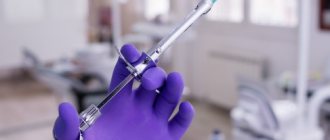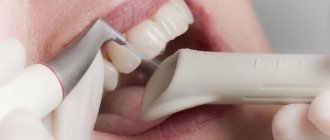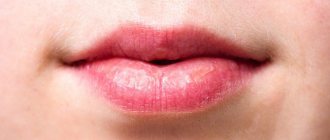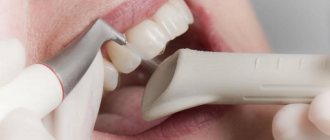The functioning of a woman’s body changes with the onset of pregnancy, and the changes very often concern the digestive system. The expectant mother is worried about toxicosis and weakness, she develops new gastronomic preferences, and the secretion of saliva increases, which causes a lot of inconvenience. Is drooling normal? Will it go away on its own or do you need to take measures to reduce the secretion of salivary fluid?
Increased salivation: causes and treatment
Hypersalivation - what is it?
Why is there a lot of saliva in the mouth?
Salivation during sleep
Excessive salivation during pregnancy
Treatment of hypersalivation
Saliva is not just a liquid secreted in the mouth. Saliva is involved in the digestion process and protects the body from bacteria. The process of salivation is not controlled by humans. Usually about 2 liters of saliva are produced per day. Under the influence of certain factors, its amount can greatly increase. In this article we will talk about the causes of increased salivation and how to treat it.
Increased salivation is a feature of successful conception
Ptyalism refers to the list of the first signs of pregnancy. In the first trimester, the amount of saliva secreted can increase several times, which leads to exhaustion of the body. In addition, the liquid constantly affects the skin and irritates the corners of the mouth and chin.
Excessive salivation usually occurs during early pregnancy and disappears or decreases by the beginning of the second trimester, along with toxicosis. But it happens that such an unpleasant symptom is accompanied by the entire period of bearing a child, as well as a feeling of nausea.
Increased salivation is affected by hormonal changes in a woman’s body. Hormones stimulate the function of certain glands, including the salivary glands. Other manifestations will help you understand that a symptom is indeed a sign of pregnancy:
- swelling and pain in the chest;
- constant fatigue;
- frequent urination;
- sensitivity to strong odors;
- dizziness.
A test and test results for the presence of the hormone hCG in the blood will help you verify your pregnancy.
Hypersalivation may be one of the early signs of pregnancy
Why is there a lot of saliva in my mouth?
Let's consider the possible causes of increased salivation
| Oral diseases. These include: stomatitis, gingivitis, glossitis, etc. Bacteria provoke irritation of the salivary glands, hence the excessive secretion of fluid. If these diseases are not treated, inflammation of the salivary gland may occur. |
| Having dentures or braces. The structures cause irritation of the mucous membrane, which provokes excessive secretion of fluid. This problem is especially noticeable in the first two weeks after installation of the structure, when adaptation occurs. |
| Gastrointestinal diseases (gastritis, pancreatitis, stomach ulcers, etc.). The problem most often occurs against the background of increased stomach acidity. Other reasons that doctors highlight: liver dysfunction, worms, stress on the pancreas. |
| Diseases of the central nervous system (cerebral palsy, Parkinson's disease, irritation of the trigeminal nerve, migraine). A similar condition occurs when the functioning of the vestibular apparatus is disrupted and blood pressure increases. |
| ENT diseases, ARVI, inflammation of the adenoids. The person begins to breathe predominantly through the mouth, as nasal breathing is difficult. The mucous membrane dries out, causing the glands to begin to work actively. |
| Changes in hormonal levels - problems with the thyroid gland, diabetes, menopause, etc. |
| Smoking. Tobacco smoke irritates the salivary glands. They begin to produce a lot of fluid. This is why smokers have the habit of spitting. |
Correction of the condition: how to reduce salivation?
Methods of dealing with the problem depend on its cause, but if the active production of salivary fluid is associated specifically with pregnancy, and not with diseases, then it will be useful to use the following tips:
- eat often, but in small portions;
- give up starchy foods that cause a “lump in the throat” feeling;
- reduce the consumption of foods that strongly irritate the taste buds (salty, sour, etc.);
- stop chewing gum;
- eat oatmeal in the morning, which normalizes stomach acidity;
- carry mint candies with you to help stop bouts of drooling;
- brush your teeth several times a day and do not forget to use mouthwash (it can be replaced with a decoction of sage or mint);
- increase the volume of fluid consumed.
Increased production of saliva is a problem, but the expectant mother should be reassured by the fact that the secreted liquid performs a number of important functions: it neutralizes the acidity of digestive juices, moisturizes the oral cavity, contains enzymes involved in digestion and has antibacterial properties, protecting the teeth. However, if the volume of saliva is large and interferes with everyday life, there is no need to force yourself to swallow it. It is better to take napkins with you and periodically spit out the liquid.
Salivation during sleep
Sometimes, when a person wakes up, he notices wet spots on the pillow. This usually happens due to extreme fatigue and sound sleep. However, if salivation during sleep becomes a pattern, you should consult a doctor.
The main factors that provoke the secretion of saliva during sleep.
- Malocclusion or missing teeth. Saliva flows out because the teeth do not close completely.
- Difficulty in nasal breathing: runny nose, deviated nasal septum, colds. All this forces you to breathe through your mouth. Since the lips do not close, the accumulated fluid flows out. This is often accompanied by snoring.
- Deep sleep.
Sources
- Kapickis M., Beinarovica I. Fascial Epicondylar Augmentation in Cases of Cubital Tunnel Syndrome With Ulnar Nerve Instability. // Tech Hand Up Extrem Surg - 2022 - Vol - NNULL - p.; PMID:33900059
- Leow JM., Clement ND., McQueen MM., Duckworth AD. The rate and associated risk factors for acute carpal tunnel syndrome complicating a fracture of the distal radius. // Eur J Orthop Surg Traumatol - 2022 - Vol - NNULL - p.; PMID:33891155
- Levina Y., Dantuluri PK. Radial Tunnel Syndrome. // Curr Rev Musculoskelet Med - 2022 - Vol - NNULL - p.; PMID:33890229
- Billig JI., Lu YT., Hayward RA., Sears ED. Surgical Timing for Carpal Tunnel Syndrome: A Comparison of Health Care Delivery in the Veterans Administration and Private Sector. // J Hand Surg Am - 2021 - Vol - NNULL - p.; PMID:33867201
- Low J., Kong A., Castro G., Rodriguez de la Vega P., Lozano J., Varella M. Association Between Diabetes Mellitus and Carpal Tunnel Syndrome: Results From the United States National Ambulatory Medical Care Survey. // Cureus - 2022 - Vol13 - N3 - p.e13844; PMID:33859898
- Abdolrazaghi HA., Khansari M., Mirshahi M., Ahmadi Pishkuhi M. Effectiveness of Tendon and Nerve Gliding Exercises in the Treatment of Patients With Mild Idiopathic Carpal Tunnel Syndrome: A Randomized Controlled Trial. // Hand (NY) - 2022 - Vol - NNULL - p.15589447211006857; PMID:33855879
- Ho TY., Chen SR., Li TY., Li CY., Lam KHS., Chen LC., Md YW. Prognostic factors in carpal tunnel syndrome treated with 5% dextrose perineural injection: A retrospective study. // Int J Med Sci - 2022 - Vol18 - N9 - p.1960-1965; PMID:33850465
- Goyal R., Mercado A.E., Ring D., Crijns TJ. Most YouTube Videos About Carpal Tunnel Syndrome Have the Potential to Reinforce Misconceptions. // Clin Orthop Relat Res - 2022 - Vol - NNULL - p.; PMID:33847604
- Wee TC., Simon NG. Asymptomatic common extensor tendon pathology in patients with carpal tunnel syndrome. // Muscle Nerve - 2022 - Vol - NNULL - p.; PMID:33847378
- Lallukka T., Shiri R., Alexanderson K., Ervasti J., Mittendorfer-Rutz E., Virtanen M. Sickness absence and disability pension after carpal tunnel syndrome diagnosis: A register-based study of patients and matched references in Sweden. // Scand J Public Health - 2022 - Vol - NNULL - p.14034948211002729; PMID:33845698
Excessive salivation during pregnancy
During pregnancy, hormonal changes occur in the female body. The main reasons why an expectant mother’s salivation increases.
- Heartburn. When the acid-base balance in the stomach is disturbed, the body begins to produce a lot of saliva. This is a defensive reaction.
- Reaction to medications.
- Toxicosis. To stop gagging, the expectant mother tries to swallow saliva less often. Therefore, it may seem that there is more saliva in the mouth than usual.
A large amount of saliva does not threaten the fetus, however, if this is a consequence of any disease, then the pregnant woman should monitor her condition.
What complications are possible?
- Impaired taste perception of food.
- Dehydration of the body.
- Insomnia, disturbance of psycho-emotional state.
- Deterioration of the skin condition on the face and body.
- Infectious diseases.
What causes toxicosis?
The question of the etiology of toxicosis remains open at the moment.
Scientists continue to find new auxiliary provoking factors that can affect the development and nature of the problem. The most justified and proven theory of the progression of toxicosis during pregnancy is the formation of a “pregnancy center”, which regulates the physiological processes of the corresponding period. Against this background, the salivary, vomiting and vasomotor centers are activated, provoking the occurrence of traditional symptoms.
Factors that provoke or intensify the manifestations of toxicosis:
- Chronic diseases of the gastrointestinal tract. It has been statistically proven that most women suffering from gastritis, duodenitis or other gastrointestinal diseases tolerate toxicosis worse.
- Chronic stress. Emotional stress causes additional stimulation of the above centers with the progression of the clinical picture.
- Bad habits (smoking, alcohol abuse).
- Age of the expectant mother. Clinically, toxicosis is more severe in women under twenty and after thirty-five years of age.
- Genetic predisposition.
The occurrence of these changes is based on the active restructuring of the woman’s body to a new state of fetal development in the womb. A fertilized egg that is implanted in the uterine cavity causes a cascade of biochemical reactions. In 90% of cases, this process is accompanied by a deterioration in the woman’s condition.
Treatment of hypersalivation
There is no single treatment method for all cases. However, you can use methods to reduce the activity of the salivary glands - sometimes they are recommended by doctors as an addition to complex therapy.
- Reception of sorbents: activated carbon, polysorb, etc.
- Taking medications prescribed by a doctor.
- Exercise therapy, massage (most often prescribed for children).
- Botulinum toxin injections.
In rare exceptions, the salivary glands are partially removed, but the downside is that there is a risk of damaging the facial nerve.
Which doctors will help you cope with this disease? Dentist, gastroenterologist, endocrinologist, neurologist, infectious disease specialist, etc.
What to do if you notice early signs of pregnancy
In order to ensure the accuracy of the signs of pregnancy, you can use the following methods for diagnosing early pregnancy:
- Donate blood for hCG. This method can be used a few days after conception. This type of pregnancy test is performed using a small blood sample that is analyzed in a hospital. It determines whether you have the pregnancy hormone in your body and in what quantity. Its accuracy is 99%.
- Use a test strip. It can be used at home from the first days of the delay. To determine pregnancy, you need to dip the reagent area of the test strip into urine. Accuracy: 99%. You can purchase Evitest or HomeTest test strips in our pharmacy.
- Use an inkjet or electronic test. They can be used at home a few days before the expected start date of menstruation. You need to remove its protective cap, place the test under stream of urine for 10 seconds, and get the result in 3-5 minutes. Accuracy: 97%. In our pharmacy you can purchase Evitest or Alpe inkjet tests.
- Get your first ultrasound. You can use this method 3-4 weeks after the start of your missed period. At this time, an ultrasound will show the fact of intrauterine pregnancy, and the place of attachment of the fertilized egg will also be determined. Accuracy: 100%.
Causes of hypersalivation: why does saliva begin to be produced faster?
The reasons for the increased work of the glands in the oral cavity lie not only in the onset of conception. Hypersalivation also appears as a result of disorders of the swallowing reflex and defects of the oral cavity.
The last reason includes damage to the lips, cheeks in the mouth area, loss of teeth and pathological conditions of the facial muscles, in which they cannot function normally. When increased production of saliva begins, we can talk about the presence of inflammation in the oral cavity - the consequences of stomatitis or gingivitis.










